Potential Voice Loss: A Side Effect Of New Chemo
Making peace with this as a SPOKEN word poet
My oncologist knows what I do for a living. I figured that out a month ago as she was telling me about the potential side effects of a new chemotherapy I’ve since begun. “One of them can be voice loss,” she said gently. “I know why this would be particularly scary for you, Andrea.”
I don’t know how long I kept staring at her face after she said that because I was no longer in my body. I was sprinting through the decades back to 1999, to an open mic at a coffee shop in Boulder, Colorado. Even my shoelaces were shaking as I walked to the stage to read a poem into a microphone for the first time. I was so nervous my voice could barely be heard over the sound of the paper rattling in my hands. But the instant I finished my final line, I knew what I wanted to do with the rest of my life.
“An unspoken poem,” Maya Angelou said, “is a half-finished poem.” I’ve heard the many arguments against that sentiment, but how words live out loud has always felt paramount to my purpose on this planet. So much so that when preparing the manuscript for my very first book of poems, I had absolutely no idea how to do it. It felt like trying to wrangle songs onto paper. It still does.
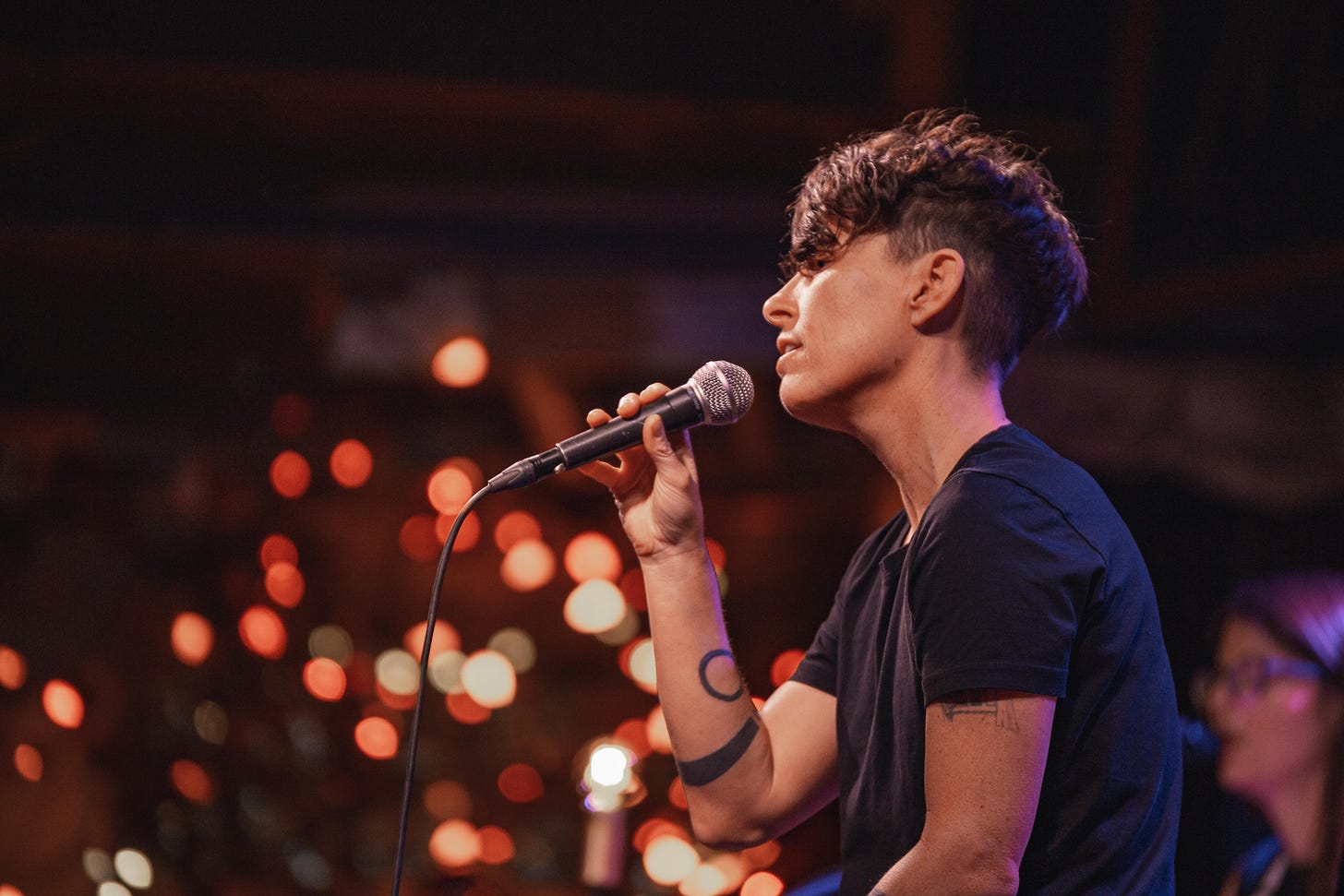
For the past three years, while cancer has largely halted my touring life, I’ve gratefully been able to buoy my artistic spirit by hosting virtual poetry readings, speaking on podcasts, and creating videos to share online. The videos began when I made the decision to share the news of my original cancer diagnosis publicly, and couldn’t find a resonant way to express myself in text. While I imagine most writers feel the opposite, I trust my voice to convey the truth much more than I trust my pen.
My chemotherapy infusions happen every three weeks. After the first round on the new drug I was a little hoarse. When I told my friend Margaret, she Googled, “Andrea Gibson poet as a little horse,” and texted me the images that popped up. Margaret had cancer herself and is a magician at making me laugh—the best medicine. During one of our first interactions she told me about the CTscan that originally diagnosed her. In an attempt to break the unbearable tension of the moment, she said to the technician, “Well, you never get to lie down during the day!” I laughed for a week over how relatable that was, and texted back, “Whenever I die, I hope my final words on my deathbed are, “Well, you never get to lie down during the day anymore!” I’ve done a lot of therapy in my life. Humor has saved me just as often.
Last week, after my second infusion of the new drug, I received relieving news—my body is currently responding positively to the new chemotherapy. Ovarian cancer can be measured with a blood test and my cancer marker dropped significantly. Meg and I celebrated, but the next day I woke up to find my voice was almost entirely gone. A whisper where a roar once lived. Eight days later, I’d almost forgotten what it felt like to have an out loud conversation with another human being, canceled my upcoming speaking events, and cried myself to sleep because I had to say no to hosting a grief writing workshop for children who had lost a loved one. Thank you for the invite, Caroline.
A number of challenging symptoms have made their way into my life over the past years. Through it all I’ve found consistent comfort in these words by Eckhart Tolle: “Acceptance of the unacceptable is the greatest source of grace in this world.” I know this grace intimately now. Two years ago, after a surgery to remove cancer from my diaphragm, the pain was so intense I swore I felt like I’d been sewn up with the blade inside. While Meg frantically called friends to see if she should be calling 911 instead, I said yes outloud, over and over, until I found myself in a state of full acceptance, and had a realization that changed my life—when not resisting, it is possible to experience intense pain while simultaneously experiencing an almost ecstatic love and gratitude for living.
It would seem voice loss would be an easier symptom to resist than physical pain. It would seem so. But when I woke up after that infusion to discover my voice was gone, I felt made of resistance. NO! NO! NO! I would have screamed, if I could have screamed. After a couple of days of managing the grief and fear by not managing it at all, I finally began to welcome the feelings that arose within me, especially the most mangled, tangled ones. After doing that, I soon found myself nestled in the arms of my most consistent and reliable savior—Curiosity. What do I have to learn from not being able to speak? How might this be an opportunity to further open my heart?
For the last decade, each night before sleep, I text myself what I learned that day so I don’t forget it by morning. Some texts I’ve sent myself:
“Your life becomes far more vibrant when you stop chronically trying to protect yourself.”
“To see the beauty in the world is to see the beauty in yourself.”
“Go in the direction of what you fear. Seek it out.”
But for ten years, what I have texted myself most often, what I have woken up to over and over, year after year, is this one word text: “Silence.”
The first time I sent myself the “silence” text was right after a therapy session in which I spoke nonstop the entire time without allowing a window of a moment for my therapist to utter a word. “Thank you so much for your support, Julie,” I said at the end of the hour. With a giant grin on her face, Julie replied, “Happy I could help!” (I am laughing so hard as I type this.)
According to Michael Singer, “If you want to know why you do something, stop doing it and see what happens.” Some things I saw in my first days of not talking:
1. Some of what I speak, I speak to avoid true communication.
2. There are feelings I’m afraid to feel that only surface in the quiet, and loneliness is the biggest one.
3. When I stop running my mouth I feel parts of me that have never rested, rest.
4. I often talk the most when I’m afraid to genuinely listen to myself.
5. When the universe is telling the truth, it rarely tells it with words.
6. Sometimes, when speaking to connect with others, I am disconnecting from myself.
7. It isn’t actually possible to connect with others while disconnecting from myself.
8. Poet, as much as it feels like my essence, is still an identity. When I let go of my attachment to identifying as a poet, my life becomes increasingly more poetic.
9. I experience an untamable kind of freedom when touching into this phrase– What is in the way, is the way.
10. When I’m quiet, I can actually hear when the squirrels in my yard are hungry. They are hungry A LOT.
The lessons have not stopped. And—unsurprisingly, as soon I committed to being guided by curiosity, my voice began to show a bit of improvement. Though I would not be able to schedule a poetry performance at the moment, and while I have no idea if I’ll wake up again tomorrow with no voice at all, I was able to have an out loud conversation with Meg today and had enough strength in my vocal cords to record a video. Much is up in the air right now, but this is now firmly planted in my being– even if my voice returns to its roar, silence and the insights it gifts me will always be part of my life moving forward. AND, let me say it again—I’m responding positively to the new chemo. Hallelujah.
P.S
Please read this very short poem titled The Quiet World by Jeffrey McDaniel, which I’m newly in love with, for obvious reasons.
Love, Andrea 🖤
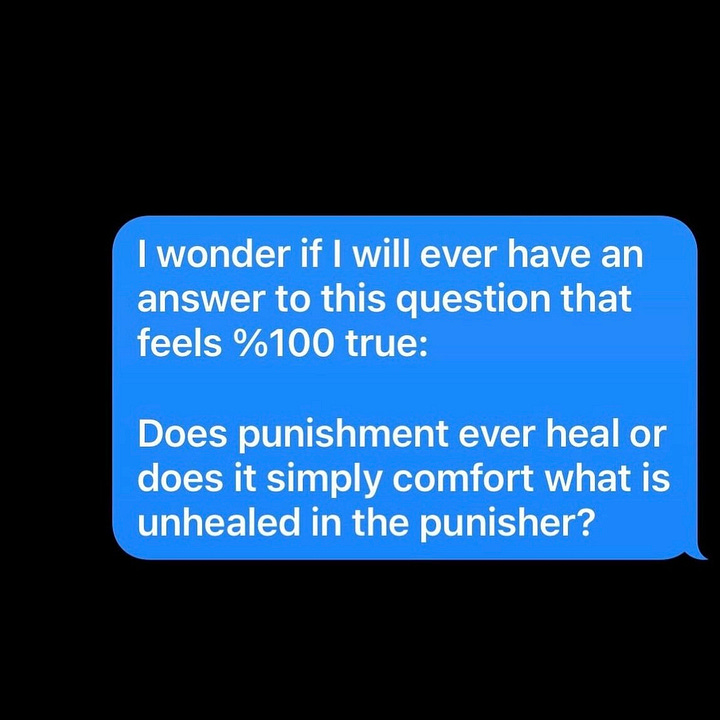
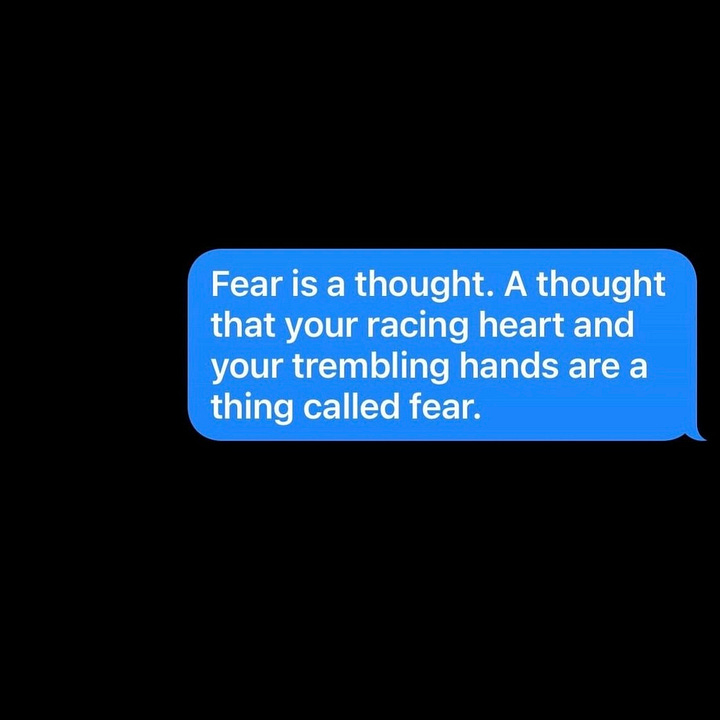
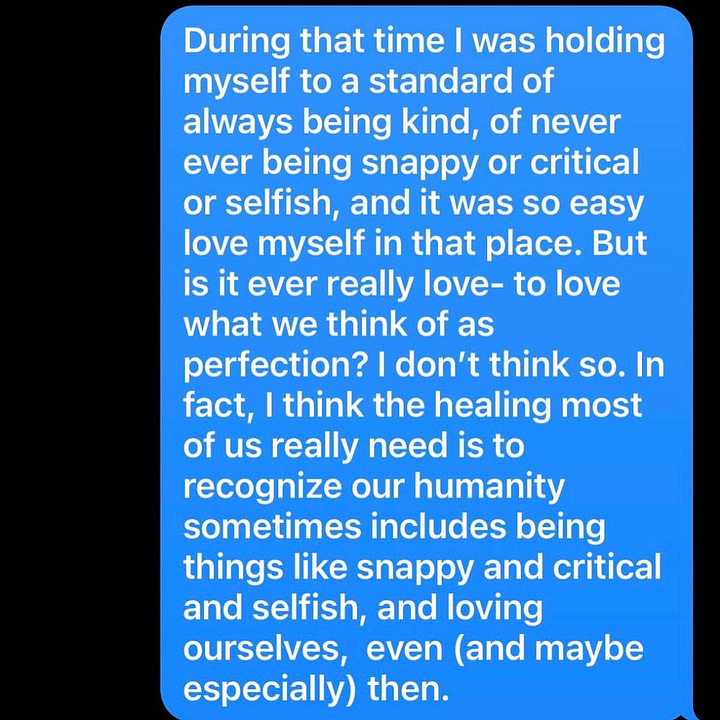
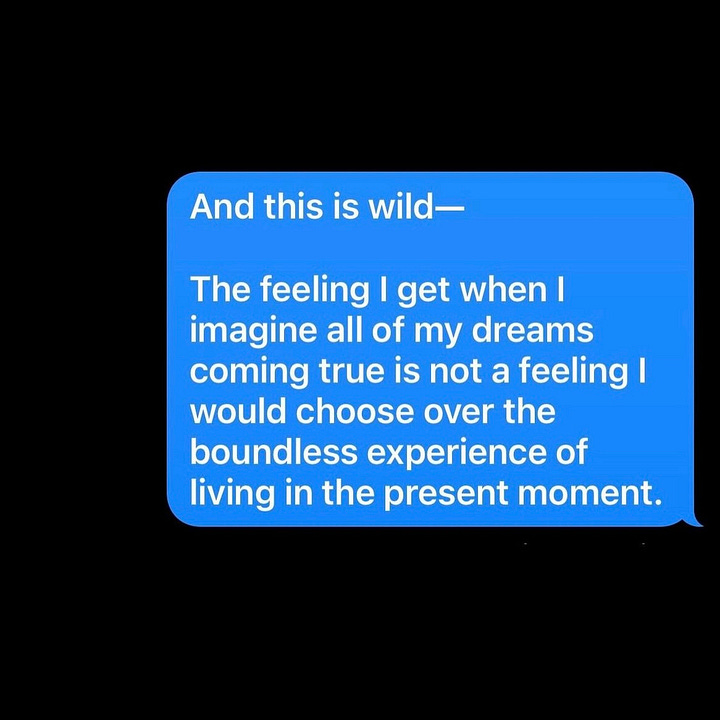
Thank you to those of you who have asked for image descriptions on the photos included in my newsletters. Currently Substack does not offer this accessibility option for gallery photos, so I’ll be including them here.
Above gallery photos: text quotes read—
I wonder if I will ever have an answer to this question that feels %100 true:
Does punishment ever heal or does it simply comfort what is unhealed in the punisher?
Fear is a thought. A thought that your racing heart and your trembling hands are a thing called fear.
During that time I was holding myself to a standard of always being kind, of never ever being snappy or critical or selfish, and it was so easy love myself in that place. But is it ever really love- to love what we think of as perfection? I don't think so. In fact, I think the healing most of us really need is to recognize our humanity sometimes includes being things like snappy and critical and selfish, and loving ourselves, even (and maybe especially) then.
And this is wild—The feeling I get when I imagine all of my dreams coming true is not a feeling I would choose over the boundless experience of living in the present moment.





Andrea, when I read your words today, I thought of my favorite excerpt from Rilke's Letters to a Young Poet:
"Be patient toward all that is unsolved in your heart
and try to love the questions themselves,
like locked rooms and like books that are now written in a very foreign tongue.
Do not now seek the answers, which cannot be given you because you would not be able to live them. And the point is, to live everything. Live the questions now.
Perhaps you will then gradually, without noticing it,
live along some distant day into the answer."
You are a breathing testimony to what it means to live the questions. Thank you for being a witness of how to show up authentically every day. ❤️
Thank you for sharing how you move through hard things. Your writing brings me comfort in times when few things can, and I’m so grateful you exist. Congratulations on the success of your new treatment!